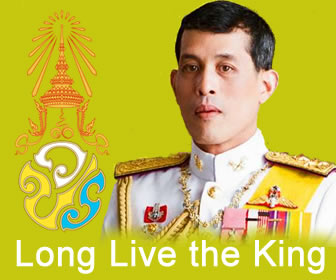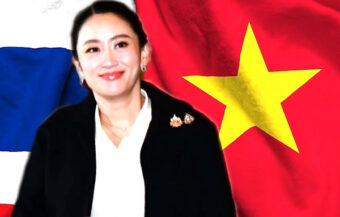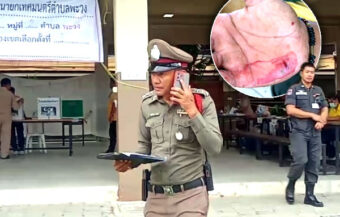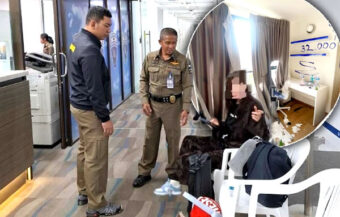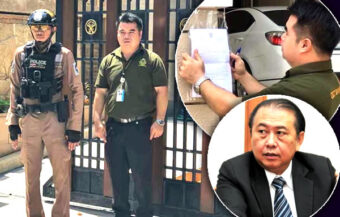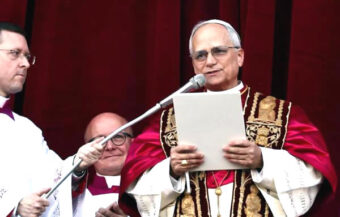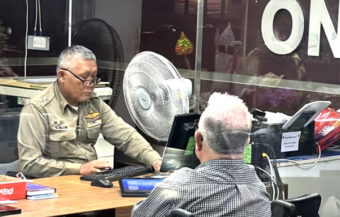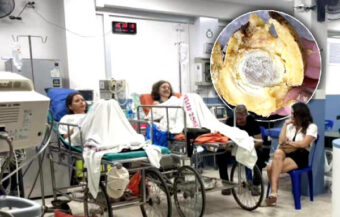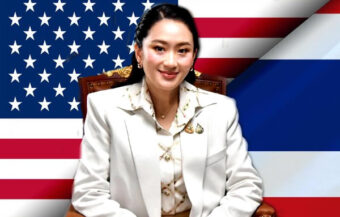This month, a Thammasat University law lecturer called for Thailand to legalise and regulate the sex industry. It follows an informative seminar and forum in September at the prestigious University which saw first hand information for the sex trade presented. One assistant professor called for the ‘crime control’ model in dealing with prostitution to be scrapped. This week’s brothel raid on a street that weeks ago was described as a prostitution free zone in Pattaya shows that Thailand can no longer turn a blind eye to the reality which everyone is aware of. The problem is the real moral qualms of genuine people in what is a very conservative society in Thailand, a situation not helped by grotesque western tabloid coverage. However, as programs with the UN have shown, the Thai sex industry could work very well with Thai authorities with a regulated regime such as exists in Germany where the industry is, in fact, financially three times bigger than Thailand. This would dramatically improve the lives of hundreds of thousands of Thai women and allow Thai authorities to deal with facts.
A raid on a prostitution establishment in Pattaya on Monday has lead to the removal of a Pattaya police chief and four senior officers in the force. The discovery of 18 sex workers, including an underage Thai girl, in a raid conducted by police specialists has also led to a case being prepared against two foreign owners thought to be a Taiwanese man and his Chinese partner. Thai partners associated with the ‘Coming Bar’ on Walking Street in Pattaya are also being looked at. The raid is matter of particular controversy coming weeks after a walkabout by senior Thai officials including police, on Soi 6 or Walking Street, which declared the area a prostitution free zone. This week’s events have highlighted the need for Thai authorities to square up to the reality of prostitution in Thailand, an industry which some estimates suggest, although the figures are questionable, may employ up to 2 million Thai women. This month, a Thammasat University law lecturer called for regulation of the industry and described the current regime as a breach of Thailand’s commitment to the UN Convention on Discrimination adopted in 1979 and the Thai constitution. It follows a Thammasat University seminar, in September last year, which showed evidence of the inner workings of the prostitution industry in Thailand. The seminar saw calls for the trade to legalized so that Thai sex workers can achieve recognition. It would mean that Thai authorities could levy taxes or charges on what is estimated to be a ฿220 billion industry with considerable side effects on Thailand’s economy.
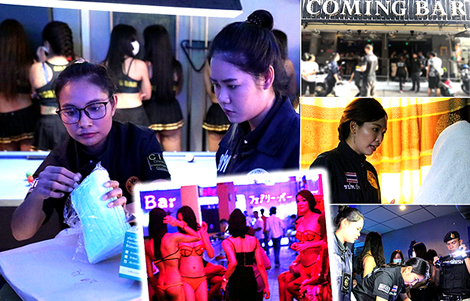
It is reported that senior Thai police officers in Pattaya have been removed from duty following this week’s raid on a bar in the resort city which was a front for an elaborate brothel employing up to 18 Thai women as prostitutes. These included one underage Thai girl who was seventeen years of age.
Pattaya police chief and four senior officers removed after shock prostitution raid
Reports suggest that the head of Thai police in Pattaya himself has been removed as well as four of his senior police officers. The raid on the Coming Bar on Soi 6, commonly known a Walking Street, took place on Monday night last. It was an elaborate operation with specialist police to deal with the Thai women working at the bar and specialist officers trained to retain evidence. Thai police authorities are reported to be working on a case against the owners of the bar, reported to be a consortium of foreigners with Thai partners. They will later be processed for deportation following revocation of their visas. The two foreigners identified so far, are a Taiwanese and Chinese businessmen.
Under age Thai girl found in large sex for sale bar
The discovery of a 17 year old under age Thai girl working at the establishment has made the case and possible legal action against the foreign owners far more serious as it expands the scope for charges against them to include human trafficking and the procurement of girls for underage sex in addition to the more minor prostitution charges under Thailand’s criminal code.
Coming bar’s moniker left westerners in little doubt
The Coming bar on Pattaya’s Walking Street was a large prostitution venue with rooms overhead to accommodate clients. A large staff of Thai women were employed at the bar with a coordinated uniform of black revealing tops with black mini skirts with yellow trim. The name of the establishment would, for instance, have left no westerner in any doubt as to the mission of the business premises.
Embarrassment for Thai officials after June 7th stunt which declared it prostitution free
The raid is acutely embarrassing to Thai law enforcement in Pattaya as on June 7th last Thai police together with a cohort of government officials and officers, walked the street in public and declared that there was no prostitution in Pattaya. Similar exercises were conducted on different occasions in 2018.
NGO provided intelligence leading to police raid
The raid on the Walking Street premises on Monday is thought to be due to intelligence and reports filed by the influential Ronnasit Foundation which is very active in Pattaya. The NGO is dedicated to fighting, among other things, poverty and injustice against Thai men and women. However, in recent years, it has focused its attention on combating human trafficking. This has a wide definition which includes luring and forcing women into prostitution based on debt incurred or luring under age Thai women into a life of prostitution.
Thai junta set its face against prostitution in Thailand
Thai authorities have, since the junta came to power in 2014, made it clear that they oppose prostitution in the country. There has been an unwritten understanding that the exploitation of underage Thai girls is not acceptable and this has extended to underage sex workers from other countries such as Laos, Cambodia, Myanmar and Vietnam. Thai authorities, in a new anti corruption mode, have shown themselves to be more determined when it comes to acting on reports of abuse or corruption from active NGOs in Thailand and indeed from concerned Thai citizens. In this way, Thailand’s police and security forces have been tackling informal gangs which have often included officials throughout Thailand exploiting the illegal prostitution trade. The key mission has been to smash human trafficking. Thailand is the economic center of Southeast Asia and consequently human trafficking activity.
Last year a huge brothel was raided in Bangkok which saw over 80 Thai women arrested
A huge brothel was raided in Bangkok in January last year. Situated on the Rama IX road, The Victoria’s Secret raid saw a staff of over 8 sex workers detained and arrested in similar scenes to Monday night in Pattaya. Raiding police at the premises including elite officers from Thailand’s DSI (Department of Special Investigations). They unearthed strong and voluminous evidence to show the involvement of government and police officials in the operation of the venue. Of course, such practices have long been common knowledge in Thailand.
Thailand’s first female tourism minister denied the role of prostitution in the toursim industry
In July 2016, the then Thai Tourism Minister, Kobkarn Wattanavrangku, the first woman to hold that position, vowed to eradicate prostitution tourism into Thailand. Ms Kobkarn denied that this was the primary impetus for tourists visiting Thailand. She was probably right but experts suggest that the prostitution industry in Thailand is valued at ฿220 billion and also accounts for up to 70% of Thailand’s tourist trade among western male visitors. This is according to one reputable NGO dedicated to empowering Thai women. Thailand’s tourism industry has shown, in the last three years, that it is no longer reliant on such demand as Thailand’s dynamic tourist executives have diversified and rebranded the industry. This success was achieved by jettisoning the old tired image of Thailand as a sex for sale paradise. Nevertheless, this market remains a key factor and one that continues to be linked with Thailand.
Numbers work in prostitution in Thailand could be as high as 2 million women
It is also being reported that sex workers in the prostitution industry are feeling a chill or anxiety factor in recent years with owners and establishment bosses becoming increasingly nervous about the police and regulatory environment. This has a knock on effect on both custom and the operations of the bars. There are no accurate figures available but the UN in 2014, estimated that there were over 120,000 prostitutes in Thailand. It is widely thought that this figure is far higher than that and may be as high as 2 million including all forms of the trade and women who work indirectly or freelance, selling sex. A figure of 800,000 to 2 million was discussed at a Thammasat University seminar in September 2018 where the current state and future of the industry was addressed.
Pattaya has long been thought to be a key center of the sex trade in Thailand. Bangkok is, by far, the biggest. It should be noted that Thailand’s huge prostitution industry primarily caters for Thai men and not foreign visitors. Therefore, every city and town in Thailand has a variety of prostitution establishments.
Foreign coverage of prostitution and tabloid stories hit a raw nerve in Thailand
Thai authorities and it must be said the general public, are particularly sensitive to foreign coverage of the industry in the foreign press and media. Since the 1960s and the heyday of tabloid journalism in western countries, sex in Thailand including cities like Bangkok and Pattaya, have long featured as tabloid exposés as well as coverage of the colorful western characters who visit Thailand and live there. It is a common and popular theme often revisited by the western press and media editors interested in selling newspapers or generating clicks.
Sensational headlines and colorful characters
The stories, which are essentially true, are however presented in a sensational style and this culture has fed into the growing number of westerners traveling to Thailand. Since the 1970s, many have made see it as a home away from home or for some, even a permanent home. Pattaya in particular, is a city full of colorful westerners who have played a part in giving it the name of ‘Sin City’ much to the consternation of those working to boost family friendly tourist activity in the resort city.
Some western travel agents won’t take bookings for Pattaya standing on feminist principles
In recent years, some travel agents in western countries, particularly those in the grips of the ‘Me Too’ movement, are taking a stance that they will not book accommodation or make travel arrangements to Pattaya on the basis of moral but in modern times more likely to be feminist principles.
Pattaya also has a high quality tourist trade
Conversely, however, the city has seen the emergence of high quality tourist venues and hotel resorts. The city and surrounding areas has become a genteel and idylic seaside home for many retired expats who come to Thailand not for the cheap sex but for a low cost of living, warm climate and beautiful scenery. In recent years, Pattaya has won many accolades as a family friendly city for holidays and has even been named as one of the top ten holiday destinations in Asia by Mastercard.
Sex trade in Pattaya has lost its edge
It must be said that in the last decade, the sex industry in the city had lost some of its edge for a number of reasons. One is that young Thai women now have better prospects. It is long known that these women move to Pattaya primarily from poorer rural locations especially from northern provinces, to earn significantly more money than they can earn in factories or normal jobs to support their families at home. This trend continues but has been reduced by better education and employment opportunities as well as a growing number of Thai women who are marrying foreigners they have met online.
Western sex tourists moving away from Thailand
Another factor in the movement away from the sex industry is that many western travelers have been deserting Thailand. Some are sex tourists heeding the words of Thailand’s tourism minister in 2016 who then told them bluntly that they are not wanted in Thailand. Another reason is the highly successful immigration crackdown since 2015 which has virtually eliminated many short term residents in Thailand. These western men used to renew tourist visas repeatedly. Unfortunately for Thailand, there is also now the growing popularity of locations such as Cambodia and Vietnam where prices including sex of sale rates, are reported to be cheaper.
UK Daily Mirror labeled Pattaya as ‘Sodom and Gomorrah’ in sensational exposé
In February 2017, the world famous Daily Mirror tabloid in the United Kingdom dubbed Pattaya as a modern ‘Sodom and Gomorrah’ referring to a biblical expression for decadence and a sinful environment. The tabloid estimated that there were over 27,000 prostitutes working in the city. The news report was covered extensively by the media in Thailand. This provoked a wry reaction, at the time, from Thailand’s Prime Minister, Prayut Chan ocha who chided the Thai journalists for believing everything written in a UK tabloid newspaper.
Thai police questioned UK tabloid’s information
It is understood that the prime minister ordered raids on some brothels in the city just after this. A Thai police officer in the city, Colonel Apichai Krobphet, took issue with the figure quoted for the number of prostitutes in Pattaya. ‘We don’t have information about such a high number of prostitutes, I don’t know where they got that from,’ he responded to press inquiries.
Raid on a Pattaya brothel saw owner and one sex worker arrested, fined ฿2,000
Within 24 hours, a raid took place on a second floor, prostitution establishment in the city where a 36 year old Thai man, Chayanuch Laokliew, was charged with facilitating prostitution. One sex worker was also arrested. Both the sex worker and the owner were fined ฿2,000 between them. It is reported that both agreed to share the cost of the fines imposed by the Thai court.
Later, after the raid, the Thai police chief suggested that what the UK tabloid had published was exaggerated information and suggested that the story may have been supplied to them by some unhappy UK businessman in the seaside city.
Over 2,100 prostitutes arrested in Pattaya in 2016 alone according to police figures
Figures from 2016 actually showed that over 2,100 prostitutes were arrested in Pattaya in the course of the year under the country’s more wide ranging prostitution legislation passed in 1996. It is reported that 15 individuals were arrested that year for facilitating prostitution. These figures were revealed by then Chonburi Police chief Somprasong Yenthuam.
Lower UN figures for Thai prostitutes linked with successful Aids prevention scheme which gave recognition to Thai sex workers
The figure released by the UN in 2014 suggesting that 123,530 Thai women were working in the industry is probably a good source but an underestimate. This is related to a highly successful campaign waged by the Thai government and UN bodies in the previous 30 years which helped to spare Thailand for the ravages of the HIV threat. At that time, Thai authorities chose to ignore the prohibition on prostitution and applying legislation. They did this in order to gain the trust of establishments selling sex in order to train Thai sex workers. The program was a huge success. It also gave the sex workers some level of recognition for their trade and since then, many sex workers are routinely given medical checkups. However, it is widely known that these efforts were limited to more visible prostitution establishments and those dealing with foreigners. Many smaller establishments and many sex workers who work freelance were not covered by these arrangements as well as newer establishments since the urgency of the threat has passed.
Thai law lecturer calls for new laws on prostitution
This month, a Thai law lecturer called for new laws to be introduced so that prostitution can be properly regulated in Thailand. Speaking at a seminar held at Thammasat University, he suggested that zones should be created for sex related activities and that these should be regulated by Thailand’s Department of Local Administration.
In line with UN conventions and the Thai constitution
Speaking at the event entitled ‘Review of the prevention and suppression of prostitution laws project,’ on June 12th last, Dr Akawat Laowonsiri even suggested that Thailand has a duty to introduce such provisions. He suggested that failure to do so was, in effect, discrimination against women in Thailand given the large numbers employed in the industry. The legal expert pointed to Thailand’s signature to the the UN convention adopted by the General Assembly in 1979 promising to eliminate discrimination against women. He also reminded his audience of Section 40 of the Thai Constitution, which copperfastens the right of Thai citizens to engage in an occupation.
Regulation of Thailand’s sex industry a matter of human rights for sex workers and wives
The law lecturer pointed to the rights of Thai wives whose husbands may be infected with sexually transmitted diseases through improper regulation of the sex industry or Thai prostitutes who are ill treated at work and denied basic employment rights. He suggested that proper regulation of the sex industry would be a step forward for human rights in Thailand.
Vietnam war did not enable prostitution in Thailand, it simply made it more visible
The law lecturer made some telling points. He pointed to what is, in fact, a steady decline in prostitution in Thailand. While popular myth suggests that Thai prostitution emerged as a result of the Vietnam war, this is not true. This has now become, in fact, an anti American trope. Prostitution exploded in Thailand at the same time as the emancipation of slaves in Thailand and an onrush of Chinese migrant workers coming to work in the kingdom at the turn of the last century. In fact, as Dr Laowonsiri pointed out, there has been a consistent decline in prostitution in Thailand since the time of the Vietnam war which coincides with the success of the Thai government in industrializing the Thai economy and fighting poverty.
Prostitution in Thailand has been declining since the 1960s as has chronic poverty
What did happen in the 1960s was perhaps that the sex industry and prostitution become more visible to the outside world. It certainly captured the imagination of tabloid news editors titillating the emerging middle classes in western countries and this, in turn, coincided with the dawning age of air travel.
At the conclusion of his presentation two weeks ago, Dr Akwat said: ‘From the conservative point of view, it is necessary to have this kind of law in place to improve society. We have to find a way to adapt to the changing world.’
Thailand’s current prostitution situation is not tenable and grotesque western tabloid coverage is part of the problem clouding objectivity
The current situation that exists in Thailand is not acceptable. This week’s events that saw Thai police officers removed following a raid in Pattaya, coming weeks after a bizarre street walk where prostitution was declared not to exist in the area, does not reflect well on Thailand. Of course, neither does the sensational tabloid press coverage in western countries, which over the years, had taken on a grotesque aspect portraying outdated stereotypes and feeding into an improper and certainly unfair picture or depiction of Thailand.
Prostitution is legal in Germany, Belgium, the Netherlands and New Zealand
Western readers and indeed our own readers, should be reminded that prostitution is far more widespread in other Asian countries than it is in Thailand. It also needs to be noted that prostitution is legal, widespread and regulated in many European countries such as Germany, Belgium or the Netherlands. It is also legal in New Zealand and even some US and Australian states.
Prostitution in Thailand should not be about crime control but what is best for Thai women
The prostitution industry in Thailand has, to some extent, being taken captive by the authorities whose duty it is to suppress it with consequently bizarre outcomes. As the Thammasat University assistant professor puts it: ‘The crime control model we use is clearly not working.’
Legalization is the answer and would be an overnight success if implemented
It can be compared with the drug war except the argument for legalizing prostitution is far stronger and valid. It would ,overnight, transform what is a very large industry into a revenue generating center for the Thai government as well as providing legal recognition and rights to hundreds of thousands of Thai women. It could actually impinge on the lives of millions of Thai women. It could also be used, as suggested by veteran sex workers, as a way in which Thai women who want to opt out of the trade and into other areas of employment could be facilitated. It would cut the ground from under sinister criminal networks that now control some aspects of the industry and assist Thai police in fighting human trafficking and the exploitation of minors.
Strong opposition to such a move in Thailand’s conservative and moral society
Before we get carried away, it should noted that while experts and nearly all those who work with Thai prostitutes support the idea of legalizing the trade and while prostitution in Thai society has always been considered as somewhat acceptable as the underside of a male dominated society, there is strong opposition to any proposal to legalize it. It is part of the paradoxical nature of Thai society. Most conservative Thai people, while they are non judgmental and accepting of prostitutes or sex workers on a personal level, will nevertheless balk at the prospect of making the activity legal. It is a moral principle in a land where such things still matter.
Prostitution in Thailand is seen as shameful to some and degrading to others
To many Thai people, prostitution is felt to be shameful and there is particular angst at the coverage and presentation of the sex trade in foreign media or even in the Thai media. Thai people are deeply sensitive to the portrayal of the country abroad. Many Thais will not be aware that the trade is legal in countries like Germany. Against this, there is also a growing number of younger, empowered Thai woman who today have adapted liberal western attitudes which particularly reviles the notion and concept of prostitution. It is seen as degrading to all women and something that must never be countenanced as legal or receiving the imprimatur of society.
Academic calls for legalization of the huge Thai sex trade as the only answer
Last year, at another Thammasat University seminar and forum, an assistant professor also called on authorities to consider the current law prohibiting prostitution in Thailand. Mataluk Orungrot suggested that it is certainly time to consider legalizing the sex trade in the kingdom.
Currently, prostitution is illegal in Thailand under the 1996 Prevention and Suppression of Prostitution Act. Under Article 286 of this law, it is is illegal to sell sex, engage in the promotion of such activity or to run an establishment linked with prostitution.
Some prostitution establishments in Thailand earn up to ฿10 million per month
During the seminar last year, some interesting research was presented. It explored the different facets of the industry in Thailand from massage parlors to beer bars or from karaoke bars to baths and sauna establishments. One estimate presented to the forum suggested that many of these establishments generate up to ฿10 million per month in income. It was also revealed that all the establishment pay bribery or corruption payments to Thai officials including police. This is supported by evidence presented to the media by authorities following the police raid last year on the large brothel on Rama IX road of Bangkok named as Victoria’s Secret.
Corruption payments range according to the income and profit of the brothels or sex bars
The forum heard that bribery payments in these establishments can range from ฿200,000 to ฿400,000 per month. It should be noted that there was no proof supporting this information but it was presented to the forum in good faith as anecdotal evidence from those engaged in the industry. Some prostitutes told the researchers that they could make as much as ฿5,000 from one encounter with a customer. Many sex workers reported earning incomes of up to ฿100,000 per month. This is well above the pay of most Thai graduates with senior positions and even after years of experience. Hence, the appeal of prostitution to some Thai women and why it is still, despite decades of decline, a strong industry. Of course, as the old quip goes, it is the oldest one in the world.
Prostitution in Thailand is a ฿220 billion industry
It is reckoned that prostitution in Thailand generates up to ฿220 billion annually for the Thai economy. Surveys of western travelers to Thailand suggest that many men, visting Thailand, come to avail of the prostitution industry. An estimate by Outreach International, an evangelical, human rights and women’s empowerment organisation, proposed in 2015 that 70% of western males visiting Thailand are their to avail of the sex industry. This was prior to the Thai government’s campaign to rebrand Thai tourism commencing in 2016. That project has indeed proved remarkably successful with a huge surge in tourism numbers from other locations and an increase in female visitors.
Highly respected NGO estimates that there are 5 to 6 million regular western sex tourists
NGOs such as Outreach International are aware there is a market of perhaps 5 or 6 million western men who regularly visit Thailand and other Southeast European countries on holidays which are quite normal tourist excursions in their own right but which include the concept of cheap sex and sunshine in vibrant surroundings. In recent years, this market is slipping from Thailand but is being more than offset by a surge in arrivals from Asian countries including package tours and individual high spending tourists.
Thailand’s first female tourist minister strongly denounced sex tourism in 2016
Thailand’s first female Tourism minister who left the post in late 2017, launched the remarkable and successful campaign to rebrand tourism during her tenure. In July 2016, she came out strongly and denounced the concept of sex tourism to Thailand. ‘Tourists don’t come to Thailand for such a thing. They come here for our beautiful culture,’ Kobkarn Wattanavrangkul told Reuters. Her remarks were endorsed by Thai Prime Minister Prayut Chan ocha who said he opposed prostitution in Thailand.
Minister left her mark and ushered more scrutiny of sex establishments by Thai police
The remarks had a very real effect. They were followed by more raids on sex establishment by Thai police. Authorities later confirmed that this activity was not designed to suppress prostitution per se but was being launched to fight human trafficking. The message from Thai police is that authorities were determined to arrest anyone involved in human trafficking or exposing underage girls to the prostitution trade. In the last few years, many Thai sex workers are reporting that the security environment for the prostitution business has become more circumspect as this week’s raid in Pattaya shows.
Current law provides for a ฿1,000 for those facilitating prostitution but deportation for foreign offenders if convicted of an offence
The current law, as the raid in Pattaya in 2016 showed, allows for a fine of ฿1,000 for those engaged in prostitution activity. However, for any foreigner involved in the trade as a business operator, as this week’s raid demonstrates, an infringement of Thailand’s laws can lead to the revocation of visas and deportation from the kingdom.
Nordic approach to prostitution pushed by feminists would wipe out Thailand sex industry
There are some, more feminist minded, advocates or even some working with NGOs in Thailand who are suggesting that Thailand adopts the Nordic model in relation to prostitution. This legalizes the activity for sex workers and penalizes those paying for sex. This is very unlikely to happen for the simple reason that it would wipe out the prostitution industry in Thailand overnight. The vast majority of the 5 to 6 million western men as well as Thai men would not breach such a law both in Thailand or their home countries. The introduction of such a law in Sweden for instance, immediately boosted the regular flight of men from that country to Thailand or other Southeast Asian countries when it came into force in 1999. It is also reported that prosecutions under the law in countries where such a regime is currently in play, are provoking public derision and calls for repeal.
Warning against such a move as it would hurt sex workers in the long term
Mataluk Orungrot from Thammasat University has researched Thai prostitutes working in the industry. He has warned against this option. ‘If we punish the customers or make buying sex illegal, we make them consider: ‘Is it worth it if I have to pay for the sex and offend the law?’ Mr Mataluk suggests that this approach would punish Thai sex workers.
Nordic model would make prostitution industry in Thailand a dangerous, fringe activity
A 40 year old Thai prostitute ‘Ping Pong’ who works in the Bangkok sex industry was quoted as fearing that such move would result in the prostitution industry in Thailand being driven even more underground. It would become a more dangerous, fringe activity frequented by more criminally minded individuals. ‘I’m afraid of the quality of customers,’ the sex worker said. ‘If buying sex were illegal, only those who are not afraid of the law, like people with criminal records,would be our customers. That’s even more dangerous,’ the Bangkok prostitute explained to the forum held at Thammasat University in 2018.
Thailand should follow the German approach to prostitution, legalize and regulate it
The Thammasat University assistant professor appeared to advocate the sort of prostitution regime we see in Germany where sex workers are registered, pay taxes, have health checkups and have employment rights. Even so, many sex workers in Germany choose not to register as they fear the stigma attached to their trade when dealing with government officials. This may be somewhat different in Thailand. Mr Mataluk points to another key benefit of legalized prostitution which is the protection of women against rape including married women from marital rape. This probably exists already as prostitution in Thailand while de jure being illegal, is in fact, de facto, legal and widespread.
UN advocated prohibition against prostitution in Thailand in 1960 later enacted by the kingdom
Prostitution was made specifically illegal in Thailand in 1960 following representations from the United Nations. In spite of the law however, Thai authorities always attempted to monitor and regulate the industry. In 1996, the 1960 law was repealed and a new legal provision put in its place with a more far reaching scope. The 1960 law left it open for the operators of establishments to operate a prostitution business without much fear of criminal sanction.
In 2003, it looked like Thailand was pursuing a course leading to legalization of the sex trade
In 2003, during the heyday of Thaksin Shinawatra’s time in power in Thailand, there was a consensus that the trade should be legalized. The Thai Ministry of Justice is reported to have looked at a regime of regulation and control. However the move stalled.
Prostitution was an accepted activity for Thai men traditionally in Thai society
In fact, prostitution while abhorred by conservative Thais, is very much accepted in Thailand. Under conventional Thai wisdom and culture, men are generally seen to have a stronger sex drive than women. This is why Thailand has a very vibrant culture where men have second or multiple wives outside the law but accepted in society due to the influence of traditional culture. It is considered acceptable for many Thai men to visit prostitutes even younger men. Many worldly Thai people see it as a better course of action than promiscuous behavior with a young Thai woman of good standing.
It is all part of Thailand’s unique and traditional culture. Part of that culture is also the key value in being non judgmental and having understanding for other people’s lives, journeys and individual fates. Prostitution has existed in Thailand since ancient times.
Even in modern Bangkok today, many wives accept prostitution but that is changing
Many Thai wives, even in modern middle class Bangkok, will today be more accepting of a husband who visits a well kept prostitution establishment rather than finding out that he has taken a second wife provided that the man can provide for his family and is discreet. Of course, times are changing and there are many also in Thailand, conservative and old fashioned in alliance with liberal feminists who would wish to see the industry completely suppressed, just as well.
Chuwit Kamolvisit – a sex industry overlord who preferred to call himself a pimp rather than a politician once ran for Governor of Bangkok
The acceptance of the prostitution industry in Thailand, in the past and up to today, is exemplified by a man, known to be a prostitution industry overlord in Bangkok. He was even elected to Thailand’s lower house of Parliament in 2005. Chuwit Kamolvisit, who was recently released from prison, once told the media and press that he was more proud to call himself a pimp than a politician. The colorful character ran for Governor of Bangkok in 2008. He has long claimed to have bribed many officials, including Thai politicians and police, to ensure the smooth running of his once huge prostitution empire.
Outrage in 2003 when Thai Rak Thai MPs insisted that their prostitution activities not be curbed
There was outrage in the western media in 2003 when the BBC reported that Thai MPs with Thailand’s leading political party at the time, Thai Rak Thai, were resisting efforts to curb their prostitution habits. One MP told The Nation newspaper then, that if such measures were enforced, the party would lose 85% of its sitting MPs. On the same newspaper, one MP, Thirachai Sirikhan said: ‘To have a mia noi (second wife or girlfriend) is an individual’s right. There should be no problem as long as the politician causes no trouble to his family or society.’
Crackdown on prostitution since 2015 has caused fear and decline in the industry
Since the Thai government’s crackdown on corruption, including the prostitution trade, began in 2015 many sex workers and operators of prostitution businesses say that the industry has become more fearful and even that the sums required for protection have shot up. This, combined with a loss of trade from western foreigners, has left some prostitution establishments on edge. In December 2017, many of the most popular sex for sale establishments in Patong in Phuket and Pattaya reported a dramatic drop off in trade at what would normally have been peak season. This week’s raid in Pattaya will make a lot of people in Thailand nervous from the business owners down to the hundreds of thousands of Thai women who ply this difficult trade.
Police raid on prostitution bar in Udon Thani linked with serving policeman and his Thai wife

